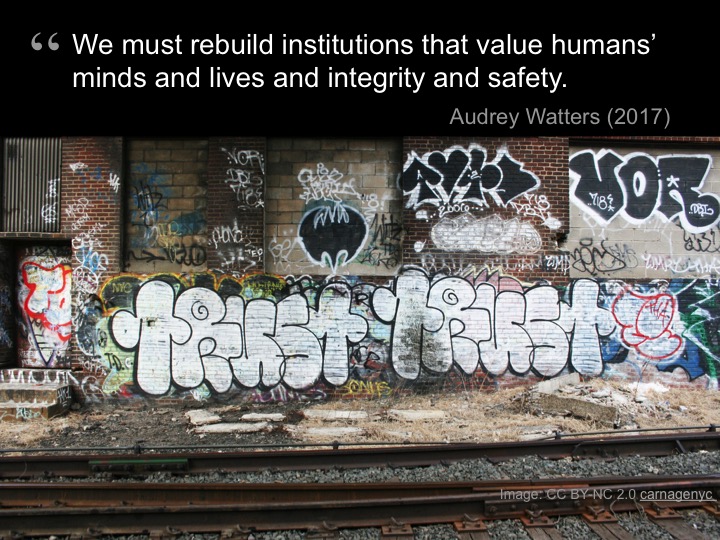
I’ve another blog post brewing from all that’s transpired in the past month, particularly the #OER18 and #OEGlobal Conferences, but today I’m presenting at the Networked Learning Conference and want to capture a few links here. I’ll be sharing some of the results from my PhD research, but want also to foreground work that has been instrumental in analysing one aspect of that work — balancing privacy and openness.
The work of all presenters here at #NLC2018 is available in the form of peer-reviewed papers on the conference website — a terrific resource. My session, titled ‘Balancing privacy and openness, using a lens of contextual integrity’ is available as a short paper and the Pecha Kucha presentation is on Slideshare:
..
My presentation begins with reference to a symposium at the 2016 Networked Learning Conference — Frances Bell, Laura Gogia, and I explored synergies, differences, and bridges between Networked Learning, Connected Learning, and Open Education. We wrote separate, linked papers and facilitated an interactive workshop at #NLC2016 through the use of short video provocations and small group activities (link to presentation). At that workshop two years ago, there was lively discussion about the clear epistemological and practical connections between these three fields, but the sense that, at least in the research domain, those connections could be stronger and more productive. Here at NLC2018 I am hoping to see more evidence of those connections.
Following this introduction, I provide a short summary of my PhD research and findings (also shared recently at OEGlobal, links here) and then dive more deeply into the notion of privacy — its historical definition based on spatial distinctions and more recent conceptualisations related to context. I draw particularly on Helen Nissenbaum’s (2004, 2010) framework of contextual integrity to explore privacy, particularly the balancing of privacy and openness as described by academics in my research study. Nissenbaum notes that:
“What matters is not merely that a particular technical device/system is not overly unusual, but that its use in a particular context, in a particular way is not overly unusual.” (Nissenbaum, 2004)
Considering platforms as an example of technical systems shows how useful this theoretical lens can be in reframing discussions of privacy. Privacy is not a universal or binary concept; it is not simply about restricting or controlling the flow of information, but rather ensuring that it flows appropriately. Rights to privacy are contextual, i.e. related to activities, roles, relationships, norms, values, and power structures. When we invite students to engage in networked learning in open online spaces, for example, we invite many things. We invite the creation and enactment of digital identities — on specific platforms with particular value systems and surveillance practices (be they LMSs/VLEs, proprietary social media platforms, etc.). We invite interactions within and beyond our learning communities, with power relations seen and unseen, intended and unintended. Nissenbaum’s definition of privacy as contextual integrity provides a useful tool for exploring the concept of privacy with students, educators, and policy makers — as well as a useful theoretical lens for researchers.
Many educators use and encourage open, connected, and networked learning practices in order to engage with learners in the co-creation of knowledge, to facilitate learner agency, to reconstruct teacher-student relationships, and to facilitate students’ development of public/civic identities, practices, and networks. The motivating goal for many also is to increase access to education and to reduce inequality. In our increasingly open, networked, participatory culture of surveillance and distraction, all citizens require critical digital literacies, network literacies, and data literacies — as well as civic and educational institutions that work to ensure safety, fairness, and equity. I conclude the presentation with a slide combining the (CC-licensed) header image above and a quote from Audrey Watters’s brilliant 2017 post Ed-Tech in a Time of Trump:

I am grateful for the thoughtful and critical work of many scholars (educators, researchers, philosophers, and more) in the areas of networked learning, connected learning, open education, and digital and higher education for providing the theories, tools, and inspiration to continue this work.
References:
Bell, F. (2016). (Dis)connective practice in heterotopic spaces for networked and connected learning. Proceedings of the 10th International Conference on Networked Learning. Lancaster, UK.
Cronin, C. (2016). Open, networked and connected learning: Bridging the informal/formal learning divide in higher education. Proceedings of the 10th International Conference on Networked Learning. Lancaster, UK.
Gogia, L. (2016). Collaborative curiosity: Demonstrating relationships between open education, networked learning and connected learning. Proceedings of the 10th International Conference on Networked Learning. Lancaster, UK.
Nissenbaum, H. (2004). Privacy as contextual integrity. Washington Law Review, 79, 119–157. https://www.scribd.com/document/54306009/Privacy-as-Contextual-Integrity
Nissenbaum, H. (2010). Privacy in context: Technology, policy, and the integrity of social life. Stanford, CA: Stanford University Press. http://www.sup.org/books/title/?id=8862.
Watters, A. (2017, February 2). Ed-Tech in a Time of Trump. Hack Education.